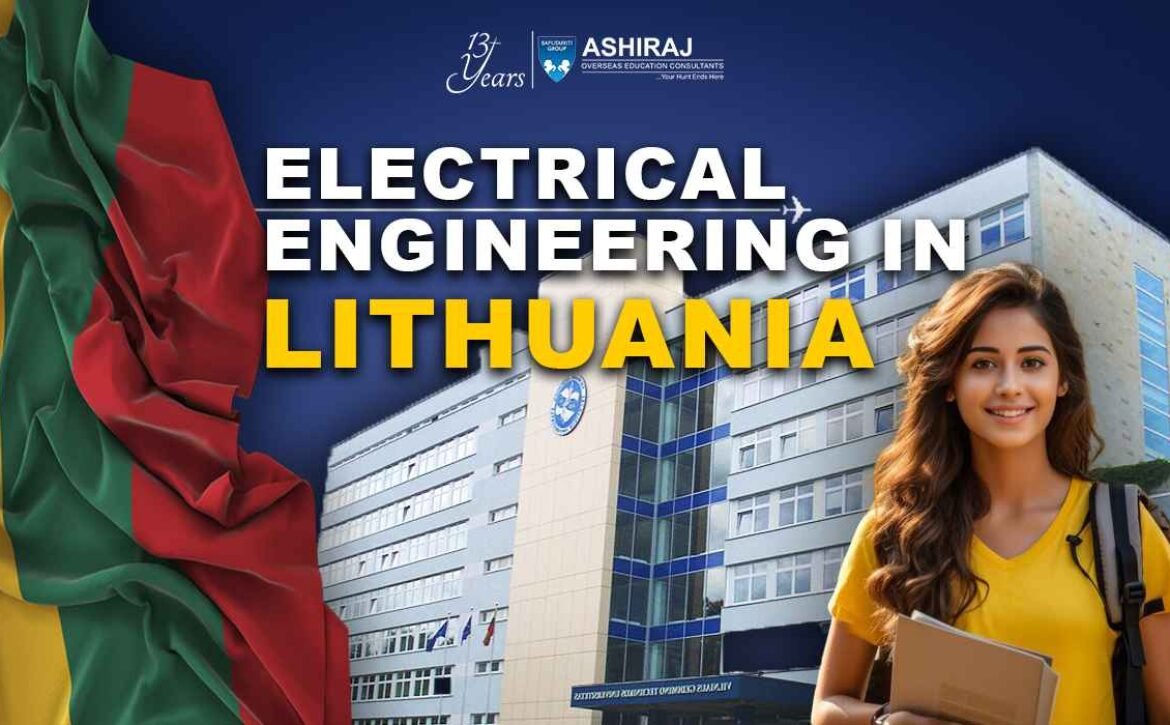
Electrical Engineering in Lithuania
Electrical Engineering in Lithuania offers a robust educational pathway blending theoretical knowledge with practical applications in cutting-edge technology. Renowned universities in Lithuania, such as Vilnius Gediminas Technical University and Kaunas University of Technology, provide comprehensive programs that equip students with skills in electronics, power systems, telecommunications, and more. These programs are designed to meet global standards, ensuring graduates are well-prepared for diverse career opportunities in the field. Lithuania’s emphasis on innovation and research excellence fosters an environment where students can engage in hands-on projects and collaborate with industry leaders.
Studying Electrical Engineering in Lithuania also offers students a chance to immerse themselves in a culturally rich and economically vibrant Baltic country. The combination of quality education, international student-friendly environments, and competitive tuition fees makes Lithuania an attractive destination for aspiring electrical engineers seeking top-notch education and global career prospects.
Why to Study Electrical Engineering in Lithuania?
- Quality Education: Lithuania offers high-quality education in Electrical Engineering, with programs accredited to international standards, ensuring a globally recognized degree.
- Cutting-Edge Curriculum: Universities in Lithuania provide a comprehensive curriculum that blends theoretical knowledge with practical skills, focusing on areas like electronics, telecommunications, and renewable energy technologies.
- Research Opportunities: Students have access to research facilities and opportunities to collaborate with industry partners, fostering innovation and hands-on experience.
- Affordable Tuition: Compared to other European countries, Lithuania offers competitive tuition fees and living costs, making it a cost-effective choice for international students.
- Multicultural Environment: The country welcomes students from around the world, providing a multicultural environment that enhances global perspectives and cultural exchange.
- English-Taught Programs: Many universities offer programs in English, eliminating language barriers and making them accessible for international students.
- Career Prospects: A degree in Electrical Engineering from Lithuania opens doors to diverse career opportunities globally, with the skills and knowledge to succeed in the field.
- EU Membership Benefits: As a member of the European Union, Lithuania offers students the advantage of EU policies and mobility programs, facilitating easier travel and study within Europe.
- Quality of Life: Lithuania boasts a high quality of life, with modern amenities, a safe environment, and a rich cultural heritage to explore outside of academic pursuits.
- Gateway to Europe: Studying in Lithuania provides a strategic location in Europe, offering easy access to other European countries for travel, internships, and career opportunities.
Top Universities to Study Electrical Engineering in Lithuania
University Name | QS World University Rankings 2023 | Type of University | Average Annual Fees | Programs Offered |
Vilnius Gediminas Technical University | 701-750 | Public | EUR 2,500 – 3,500 | Electrical Engineering, Electronics, Power Engineering |
Kaunas University of Technology | 801-1000 | Public | EUR 2,000 – 3,000 | Electrical Engineering, Telecommunications Engineering, Renewable Energy |
Vilnius University | 1001+ | Public | EUR 2,000 – 3,000 | Electrical Engineering, Computer Engineering |
Klaipeda University | 1001+ | Public | EUR 2,000 – 3,000 | Electrical Engineering, Marine Engineering |
Lithuanian University of Health Sciences | 1001+ | Public | EUR 2,000 – 3,000 | Biomedical Engineering, Electrical Engineering |
This table presents the top universities in Lithuania offering Electrical Engineering programs, ranked by QS World University Rankings 2023. These institutions provide a range of specializations within Electrical Engineering, from electronics and telecommunications to power systems and renewable energy technologies. Public universities dominate the list, offering affordable average annual fees between EUR 2,000 to 3,500. Students can expect a rigorous academic environment combined with practical learning opportunities, preparing them for diverse careers in the field. Whether pursuing studies in Vilnius, Kaunas, or Klaipeda, students benefit from Lithuania’s commitment to quality higher education and its welcoming environment for international students.
Course Curriculum for Electrical Engineering in Lithuania
- Core Subjects: The curriculum covers fundamental areas such as circuit theory, electromagnetics, and digital electronics, providing a strong theoretical foundation.
- Specialized Tracks: Students can choose from specialized tracks including power systems, telecommunications, and control systems, tailoring their studies to their career interests.
- Laboratory Work: Emphasis on practical skills with extensive laboratory work in electronics, microprocessors, and power electronics, enhancing hands-on experience.
- Project-Based Learning: Opportunities for project-based learning where students apply theoretical knowledge to real-world engineering problems, fostering innovation and creativity.
- Industry Collaborations: Collaboration with industry partners enables students to work on industry-relevant projects and gain insights into current trends and technologies.
- Internship Opportunities: Optional internships allow students to gain practical experience in local and international companies, preparing them for the workforce.
- Research Projects: Involvement in research projects under faculty supervision, encouraging critical thinking and problem-solving skills in advanced engineering topics.
- Seminar Series: Regular seminars and workshops by industry experts and academic professionals provide additional learning opportunities and networking prospects.
- Soft Skills Development: Focus on developing communication, teamwork, and leadership skills essential for successful careers in Electrical Engineering.
- Capstone Projects: Culmination of studies with a capstone project where students demonstrate their mastery of engineering principles through a significant research or design project.
Eligibility Criteria & Admission Requirements for MS in Electrical Engineering in Lithuania
- Language Proficiency: Applicants must demonstrate proficiency in English with a minimum score of 6.0 in IELTS or 80 in TOEFL iBT. The scores should not be older than two years.
- Academic Qualifications: Candidates need to provide proof of secondary school completion certificates (high school diploma or equivalent) and transcripts demonstrating strong academic performance in relevant subjects.
- Standardized Tests: Submission of GRE or GMAT scores is required, with recommended scores around 300 for GRE and 600 for GMAT, although specific requirements may vary by university.
- Passport & Student Visa: Valid passport with at least six months validity beyond the intended period of stay and a student visa obtained from the Lithuanian embassy or consulate in the applicant’s home country.
- Work Experience: While not mandatory, relevant work experience in Electrical Engineering or related fields can strengthen an application, demonstrating practical knowledge and skills.
Test | Minimum Score Required |
IELTS | Overall 6.0 |
TOEFL iBT | 80 |
GRE | 300 |
GMAT | 600 |
These eligibility criteria ensure that applicants are academically prepared and proficient in English to successfully undertake Electrical Engineering studies in Lithuania.
Documents Required for Studying Electrical Engineering in Lithuania
- Passport: A valid passport with at least six months validity beyond the intended period of stay in Lithuania.
- Two Letters of Recommendation (LOR): Academic or professional recommendations that attest to the applicant’s skills, character, and potential for success in Electrical Engineering studies.
- Statement of Purpose (SOP): A personal statement outlining the applicant’s academic background, career goals, and reasons for choosing Electrical Engineering in Lithuania.
- Curriculum Vitae (CV): A detailed resume highlighting educational qualifications, work experience, skills, and achievements relevant to the field of Electrical Engineering.
- Official High School Transcripts: Certified transcripts of secondary school education demonstrating academic performance and completion of required coursework.
- Certificates: Any additional certificates or qualifications relevant to Electrical Engineering studies, such as language proficiency certificates (IELTS or TOEFL).
- Work Experience Certificate: If applicable, a certificate verifying relevant work experience in Electrical Engineering or related fields.
- Proof of Financial Resources: Evidence of sufficient funds to cover tuition fees, living expenses, and other costs associated with studying in Lithuania. This may include bank statements, sponsorship letters, or scholarship awards.
These documents are essential for assessing the applicant’s eligibility and suitability for pursuing Electrical Engineering studies at universities in Lithuania, ensuring compliance with academic and visa requirements.
Admission Process for Electrical Engineering in Lithuania
- Application Submission: Complete the online application form on the university’s official website, ensuring all sections are accurately filled out.
- Document Submission: Gather and submit required documents, including academic transcripts, standardized test scores (IELTS/TOEFL, GRE/GMAT), passport copy, CV, SOP, and LORs.
- Application Fee: Pay the application fee, if applicable, as specified by the university. Fees vary and are non-refundable.
- Evaluation: The university admissions committee reviews the application package, assessing academic qualifications, test scores, and supporting documents.
- Interview (if required): Some universities may conduct interviews to further assess the applicant’s suitability and motivation for studying Electrical Engineering.
- Admission Decision: Upon review, the university notifies applicants of their admission status. Successful candidates receive an offer letter.
- Acceptance of Offer: Accepted students must confirm their acceptance by the specified deadline, often by paying a deposit or signing and returning the acceptance letter.
- Visa Application: Obtain a student visa from the Lithuanian embassy or consulate in your home country, presenting the offer letter, proof of finances, and other required documents.
- Arrival and Registration: Upon receiving the visa, plan travel to Lithuania. Attend the university’s orientation program and complete the registration processes.
- Commencement of Studies: Begin classes according to the academic calendar, engaging in orientation activities and starting coursework in Electrical Engineering.
Following these steps ensures a smooth admission process for prospective students aspiring to study Electrical Engineering in Lithuania, facilitating a seamless transition into academic life abroad.
“Education is the most powerful weapon which you can use to change the world.”
Nelson Mandela
Cost of Electrical Engineering Course in Lithuania
- Tuition Fees: Annual tuition fees for Electrical Engineering programs in Lithuania range from approximately EUR 2,000 to EUR 3,500, depending on the university and program.
- Living Expenses: Estimated living costs including accommodation, food, transport, and other personal expenses average around EUR 400 to EUR 700 per month, varying based on location and lifestyle.
- Additional Costs: Additional expenses may include health insurance, study materials, student union fees, and miscellaneous charges, amounting to approximately EUR 1,000 to EUR 1,500 annually.
- Scholarship Opportunities: Various scholarships and financial aid options are available for international students, covering tuition fees partially or fully based on academic merit or financial need.
- Part-Time Work: Students can explore part-time job opportunities to supplement their income, with regulations allowing international students to work part-time during the academic year and full-time during holidays.
- Cost of Language Proficiency Tests: Expenses related to language proficiency tests like IELTS or TOEFL, required for admission, should also be considered in the overall cost.
- Currency Exchange and Banking: Understanding currency exchange rates and banking fees for international transactions is essential for managing finances effectively while studying in Lithuania.
Understanding these cost factors helps prospective students plan their budget and financial resources accordingly when pursuing Electrical Engineering studies in Lithuania.
Scholarships for Electrical Engineering Courses in Lithuania
Scholarship Name | Amount | Application Deadline |
Lithuanian Government Scholarships | Full tuition waiver + stipend | Varies by program |
Vilnius Gediminas Technical University Scholarships | Partial tuition coverage | May 31 |
Kaunas University of Technology Scholarships | Partial tuition coverage | June 15 |
State Scholarship Foundation of Lithuania | Varies | April 15 |
Erasmus+ Scholarships | Varies | February 1 |
These scholarships offer financial support to international students pursuing Electrical Engineering studies in Lithuania. The Lithuanian Government Scholarships provide full tuition coverage and a stipend, with application deadlines varying by program. Universities like Vilnius Gediminas Technical University and Kaunas University of Technology offer partial tuition coverage scholarships with specific deadlines in May and June respectively. The State Scholarship Foundation of Lithuania and Erasmus+ Scholarships also provide varying amounts of financial aid, supporting students based on academic merit and other criteria. Prospective applicants should check specific eligibility requirements and deadlines for each scholarship opportunity to ensure timely application submission and consideration for funding.
Career Opportunities After Electrical Engineering in Lithuania
Job Profile | Average Salary (EUR/month) |
Electrical Engineer | 1,500 – 2,500 |
Electronics Engineer | 1,400 – 2,300 |
Power Systems Engineer | 1,600 – 2,800 |
Telecommunications Engineer | 1,600 – 2,900 |
Renewable Energy Engineer | 1,600 – 2,800 |
Graduates of Electrical Engineering programs in Lithuania can pursue various career paths with competitive salaries. Electrical Engineers typically earn between EUR 1,500 to EUR 2,500 per month, depending on experience and specialization. Electronics Engineers and Power Systems Engineers also enjoy similar salary ranges, averaging from EUR 1,400 to EUR 2,800 monthly. Telecommunications Engineers and Renewable Energy Engineers earn slightly higher, ranging from EUR 1,600 to EUR 2,900 per month. These roles span across industries such as manufacturing, telecommunications, energy, and research, offering opportunities for professional growth and development in Lithuania’s dynamic job market. With a solid foundation in Electrical Engineering from Lithuanian universities, graduates are well-equipped to contribute to technological advancements and innovation while enjoying competitive salaries in their chosen fields.
Frequently Asked Questions About Electrical Engineering in Lithuania
Some top universities in Lithuania offering Electrical Engineering programs include Vilnius Gediminas Technical University and Kaunas University of Technology.
Yes, many universities in Lithuania offer Electrical Engineering programs in English, making them accessible to international students.
Admission requirements generally include academic transcripts, language proficiency tests (IELTS/TOEFL), standardized test scores (GRE/GMAT), and a statement of purpose.
The average tuition fees range from EUR 2,000 to EUR 3,500 per year, with additional living expenses estimated between EUR 400 to EUR 700 per month.
Yes, several scholarships are available, such as the Lithuanian Government Scholarships and university-specific scholarships, covering tuition partially or fully.
Graduates can pursue careers as Electrical Engineers, Electronics Engineers, Power Systems Engineers, Telecommunications Engineers, or Renewable Energy Engineers with competitive salaries.
Typically, an undergraduate degree in Electrical Engineering takes around 3 to 4 years to complete, depending on the program and university.
While not mandatory, relevant work experience can strengthen an application, especially for competitive programs and scholarships.
The application process involves submitting an online application, academic documents, standardized test scores, and possibly attending an interview.
International students in Lithuania enjoy a vibrant cultural scene, affordable living costs, and opportunities to explore historic cities like Vilnius and Kaunas while pursuing their studies.




